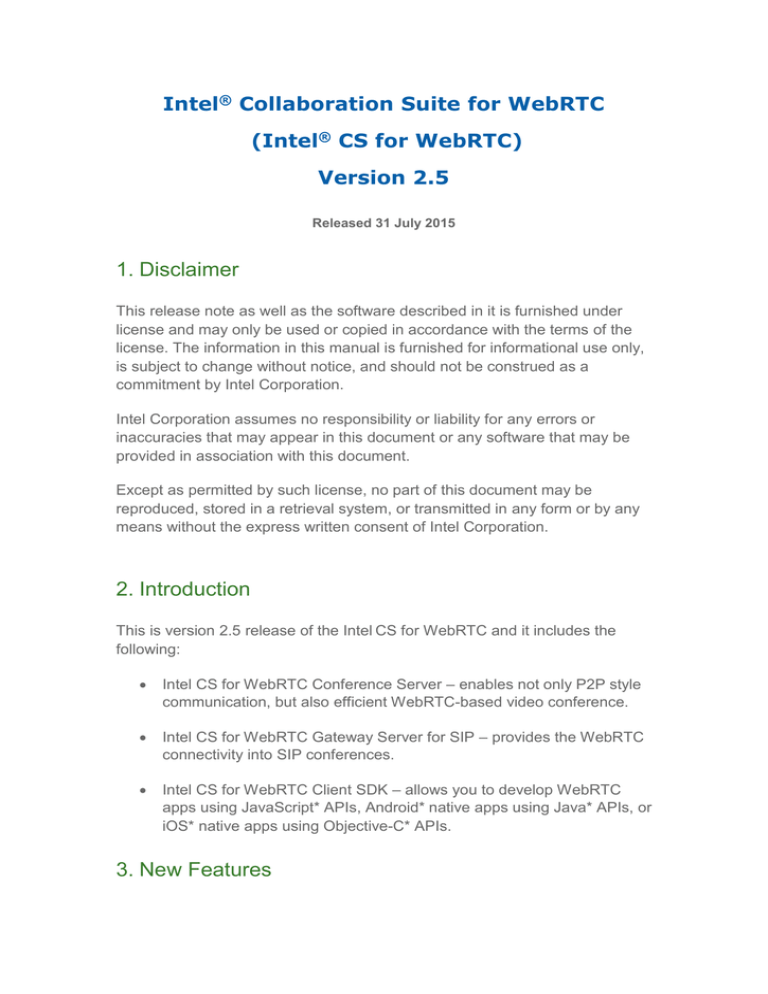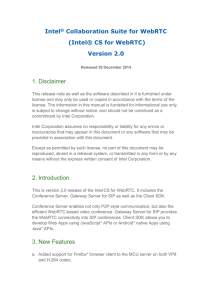1. Disclaimer 2. Introduction 3. New Features
advertisement

Intel® Collaboration Suite for WebRTC
(Intel® CS for WebRTC)
Version 2.5
Released 31 July 2015
1. Disclaimer
This release note as well as the software described in it is furnished under
license and may only be used or copied in accordance with the terms of the
license. The information in this manual is furnished for informational use only,
is subject to change without notice, and should not be construed as a
commitment by Intel Corporation.
Intel Corporation assumes no responsibility or liability for any errors or
inaccuracies that may appear in this document or any software that may be
provided in association with this document.
Except as permitted by such license, no part of this document may be
reproduced, stored in a retrieval system, or transmitted in any form or by any
means without the express written consent of Intel Corporation.
2. Introduction
This is version 2.5 release of the Intel CS for WebRTC and it includes the
following:
Intel CS for WebRTC Conference Server – enables not only P2P style
communication, but also efficient WebRTC-based video conference.
Intel CS for WebRTC Gateway Server for SIP – provides the WebRTC
connectivity into SIP conferences.
Intel CS for WebRTC Client SDK – allows you to develop WebRTC
apps using JavaScript* APIs, Android* native apps using Java* APIs, or
iOS* native apps using Objective-C* APIs.
3. New Features
1. The Client SDK now provides support to develop native apps for iOS on
both P2P and conference communications.
2. Support for Real Time Streaming Protocol (RTSP) stream input into MCU
conferences.
3. A flexible media recording with added forward stream recording and
user-controlled recording switch across streams.
4. Support for on-the-fly display region control in mix stream for each
participant.
5. Enhanced WebRTC Gateway for SIP with better QoS control and
compatibility with third-party SIP conferences.
4. Changes
1. Client SDK for Android:
a. Added the methods setMirror and cleanFrame in the class
VideoStreamsView.
b. Updated the method startRecorder and stopRecorder in the class
ConferenceClient for more flexible media recording control.
2. Client SDK for JavaScript
a. Deprecated audio recording on the client side of the JavaScript SDK
for Android.
b. Removed the methods inviteWithStream and acceptWithStream in
the class PeerClient, which provided compatibility to Firefox* due to
their limitation on renegotiation support.
c. Changed the background color setting for mix stream in method
N.API.createRoom from limited predefined values to flexible RGB
color format value.
d. Added RTSP URL input for method create in class LocalStream.
e. Added the methods mix and unmix in the class ConferenceClient to
inform the server whether the published stream should be included in
the mix stream.
f.
Added the method setRegion in class ConferenceClient to set the
display region in mix stream for each participant.
g. Added the methods playVideo, pauseVideo, playAudio and
pauseAudio in class Stream to inform MCU whether sending video or
audio data to the subscriber of this RemoteStream.
h. Modified the method startRecorder and stopRecorder in class
ConferenceClient to provide flexible media recording controls.
5. Known Issues
Client SDK for iOS:
1. Not all the features found in the Client SDK for JavaScript and Android
are yet available in the Client SDK for iOS. This version only supports
main functionality of P2P and conference chat.
Client SDK for JavaScript:
2. JavaScript P2P SDK does not support Firefox since current version of
Firefox does not fully support peer connection renegotiation.
Client SDK for Android:
1. Android SDK does not support P2P conference room.
2. Android SDK does not support room level configuration.
MCU Server:
1. Chrome* browser does not support audio-only scenario with mix stream
on GPU-accelerated MCU server. The workaround is the subscriber
must explicitly specify the mix stream subscribe parameters as audio
only, as follows:
“ConferenceClient.subscribe(stream, {video: false, audio:
true});”.
2. Current MCU server only supports media recording with VP8 video
codec; H.264 is not supported.
Gateway Server for SIP:
1. It only supports SIP devices that can decode video packets with
non-interleaved packetization mode due to the H.264 encoding engine
limitation on max slice size setting.
2. It does not support SIP devices that have been initialized with
audio-only call and containing a video “m” line in its offer SDP to
WebRTC client.
Plugin for Internet Explorer* (IE):
1. The plugin only supports IE versions 9, 10 and 11 because of
compatibility issues between the JavaScript SDK and earlier versions of
IE.
2. The plugin does not support screen sharing.
6. Important Notes
The Intel CS for WebRTC provides secure video conference experience,
including secure WebSocket on signaling, secure Room Token on user
authentication, SRTP/DTLS on media transportation, HTTPS/SSL on sample
web app, etc. This may not be sufficient for specific end customer’s
deployment environments and Intel Corporation assumes no responsibility for
potential security risks.
The following notes explain some special conditions for using the APIs:
a. Peer Server is deployed as reference implementation of signaling
server for Peer to Peer Chat, which hasn’t support scaled deployment
solution yet.
b. The default TURN/STUN server is set to our sample server. You should
replace it with your own server since the sample server may not always
work.
* Other names and brands may be claimed as the property of others.
